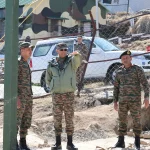In every military organization, the Commanding Officer (CO) holds a position of immense authority and responsibility. Often regarded as the backbone of a unit, the CO ensures discipline, readiness, operational success, and the welfare of soldiers under their command. The power of a CO is not just about giving orders but about leading from the front, making critical decisions, and being accountable for every action of the unit.
This article explains the roles, duties, powers, and responsibilities of a Commanding Officer (CO) in detail.
Who is a Commanding Officer?
A Commanding Officer (CO) is the officer in charge of a military unit, battalion, regiment, ship, or station. Depending on the branch of the armed forces, the title may apply to:
- A Colonel or Lieutenant Colonel commanding a battalion in the Army.
- A Captain or Commander commanding a warship in the Navy.
- A Group Captain or Wing Commander in charge of an Air Force base or squadron.
Regardless of rank, the CO is entrusted with the full command and overall responsibility of their unit.
Power of a Commanding Officer
The power of a Commanding Officer comes from the legal authority vested in them, the trust of their superiors, and the respect of their subordinates. The CO has:
- Administrative Power – To manage personnel, equipment, and resources.
- Disciplinary Power – To enforce military laws, maintain discipline, and impose punishments when necessary.
- Operational Power – To plan, direct, and execute missions and operations.
- Moral Authority – To inspire, motivate, and uphold the morale of the troops.
Thus, a CO is not just a commander but a leader, mentor, and decision-maker whose judgment directly impacts mission success and the lives of soldiers.
Key Roles and Responsibilities of a CO
1. Leadership
A CO is first and foremost a leader. Their responsibility is to set the tone, define the vision, and motivate their troops. A good CO leads by example, inspires confidence, and ensures that the unit remains cohesive and mission-ready.
2. Operational Planning
The CO oversees strategic and tactical planning. From counter-insurgency missions to large-scale operations, they ensure resources are deployed effectively. They coordinate with higher headquarters and allied units to execute missions successfully.
3. Training and Readiness
A military unit must always remain prepared. The CO is responsible for:
- Designing and approving training programs.
- Conducting exercises and mock drills.
- Evaluating the readiness and performance of soldiers.
This ensures the unit can operate effectively in peace, crisis, or war.
4. Discipline and Welfare
Maintaining discipline is a cornerstone of military effectiveness. A CO ensures rules, regulations, and ethical standards are upheld. At the same time, they must care for the welfare of soldiers, resolve disputes, and address personal or professional grievances.
5. Communication
The CO acts as the link between higher command and subordinates. Orders, instructions, and feedback flow through them. Clear communication ensures that the intent of higher command is translated into effective action on the ground.
6. Decision-making
From the battlefield to administrative matters, a CO makes critical decisions under pressure. They must analyze situations, assess risks, and take responsibility for the outcomes.
7. Accountability
A CO is accountable for everything that happens under their command – whether it’s operational success, failure, or misconduct. This accountability makes the role one of the most challenging in the armed forces.
8. Safety and Security
The safety of personnel and equipment is a top priority. The CO enforces safety protocols, ensures weapon security, and safeguards classified information.
Qualities of an Effective Commanding Officer
To command effectively, a CO must embody certain qualities:
- Integrity – Trustworthiness and moral courage.
- Decisiveness – Ability to make quick, sound decisions.
- Empathy – Understanding and supporting the troops.
- Strategic Thinking – Vision to plan for both immediate and long-term goals.
- Resilience – Staying calm and composed under pressure.
Difference Between Commanding Officer (CO) and Officer Commanding (OC)
While often used interchangeably, there is a distinction:
- Commanding Officer (CO): Senior-most officer in charge of an entire unit or formation (e.g., battalion, ship, airbase).
- Officer Commanding (OC): Heads a smaller sub-unit (e.g., a company within a battalion).
Thus, while an OC commands a smaller segment, the CO has overall authority.
Importance of a CO in Modern Warfare
In today’s era of advanced technology, drones, cyber warfare, and joint operations, the role of a CO remains indispensable. Machines may assist in execution, but the human element of leadership and decision-making rests with the CO. Their ability to adapt, innovate, and motivate soldiers is what ensures mission success.
Conclusion
The power of a Commanding Officer (CO) is not just in authority but in the responsibility they carry for their unit and its personnel. From leading in combat to maintaining discipline, ensuring training, and safeguarding welfare, the CO stands as the pillar of strength for their unit.
Their leadership directly impacts mission effectiveness, morale, and the honor of the armed forces. In simple terms, a CO is more than a commander – they are the embodiment of discipline, responsibility, and sacrifice.












